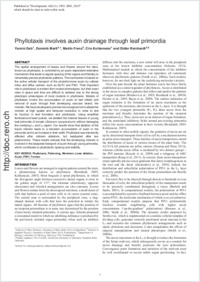Phyllotaxis involves auxin drainage through leaf primordia
- Deb, Yamini Institute of Plant Science, University of Bern, Switzerland
- Marti, Dominik Institute of Applied Physics, University of Bern, Switzerland
- Frenz, Martin Institute of Applied Physics, University of Bern, Switzerland
- Kuhlemeier, Cris Institute of Plant Science, University of Bern, Switzerland
- Reinhardt, Didier Department of Biology, University of Fribourg, Switzerland
-
06.01.2015
Published in:
- Development. - 2015, vol. 142, no. 11, p. 1992–2001
English
The spatial arrangement of leaves and flowers around the stem, known as phyllotaxis, is controlled by an auxin-dependent reiterative mechanism that leads to regular spacing of the organs and thereby to remarkably precise phyllotactic patterns. The mechanism is based on the active cellular transport of the phytohormone auxin by cellular influx and efflux carriers, such as AUX1 and PIN1. Their important role in phyllotaxis is evident from mutant phenotypes, but their exact roles in space and time are difficult to address due to the strong pleiotropic phenotypes of most mutants in phyllotaxis. Models of phyllotaxis invoke the accumulation of auxin at leaf initials and removal of auxin through their developing vascular strand, the midvein. We have developed a precise microsurgical tool to ablate the midvein at high spatial and temporal resolution in order to test its function in leaf formation and phyllotaxis. Using amplified femtosecond laser pulses, we ablated the internal tissues in young leaf primordia of tomato (Solanum lycopersicum) without damaging the overlying L1 and L2 layers. Our results show that ablation of the future midvein leads to a transient accumulation of auxin in the primordia and to an increase in their width. Phyllotaxis was transiently affected after midvein ablations, but readjusted after two plastochrons. These results indicate that the developing midvein is involved in the basipetal transport of auxin through young primordia, which contributes to phyllotactic spacing and stability.
- Faculty
- Faculté des sciences et de médecine
- Department
- Département de Biologie
- Language
-
- English
- Classification
- Biological sciences
- License
-
License undefined
- Identifiers
-
- RERO DOC 255658
- DOI 10.1242/dev.121244
- Persistent URL
- https://folia.unifr.ch/unifr/documents/304233
Statistics
Document views: 105
File downloads:
- pdf: 245
